New research commissioned by Scurri, the software provider that connects and optimises the ecommerce ordering, shipping, and delivery process, has today released the results of a nationally representative survey on consumer shopping behaviours and sentiment in the UK both post Brexit and post Pandemic.
The survey of over 2,000 UK adults, completed in March 2021, shows that rather than slowing down when lockdown restrictions lift, the ecommerce growth boom looks set to further accelerate as shoppers commit to remaining online post the re-opening of retail.
The study also looked at the effect of Brexit on shopping habits and discovered strong consumer preference for buying British brands post Brexit, to help support the local economy.
Consumer spending and post pandemic ecommerce growth
More than three in five (61%) people across the UK plan to continue to shop online in 2021 at the same rates as 2020, even when shops reopen for in-store shopping. Survey data captured during lockdown showed 71% of British consumers received between 1-3 online shopping orders every week, 12% had 4-6 parcels delivered every week and 5% of UK online shoppers had as many as 7-15 packages delivered on a weekly basis.
Almost half (48%) of all consumers aged 18-24 stated they would continue to shop online even when shops reopen, the highest among all age ranges in the UK. The younger generation lead the way for many online shopping statistics, including being the most likely to use a mobile phone to do their online shopping, with almost one-quarter (23%) of all consumers aged 18-24 shopping from their phones.
One-quarter (24%) of full-time students are more likely to shop online than employed consumers, acknowledging that they shop online at least once every two to three weeks.
“The ecommerce industry has seen explosive growth with millions of shoppers being converted to online shoppers literally overnight, because of COVID. Overall, ecommerce has witnessed three years of growth over the last three quarters, and has accelerated five years ahead of itself within the space of a year.
Ecommerce trends and performance has accelerated, but things have also gotten far more complex. Consumer expectations have increased and many ecommerce novices have become online shopping experts overnight. The average online consumer is now more informed and less patient regarding delivery and they rightly expect excellent service and delivery from a trusted brand and retailer. For that reason, the majority of businesses are now delivery dependent and the moment of truth has moved from the store to the home. Customers are won or lost in that last delivery mile.”
– Rory O’Connor, CEO and Founder, Scurri
Consumer sentiment on retail post Brexit
Brexit has also had an effect on the ecommerce industry in the UK, with new rules and regulations that came into effect on the 1st of January.
One in five (20%) of people in the UK strongly disagree with the fact that they have been properly informed by retailers and the websites they shop on about the changes to the online shopping experience due to Brexit. Almost half (43%) of people disagree with this statement in some capacity.
As a result of Brexit, it is possible that consumers will experience changes to their online shopping experience when ordering from outside of the UK and over two in five (44%) of people in the UK believe it is the responsibility of the government, not retailers and brands, to effectively communicate with consumers about the changes they should expect.
Only one-quarter (24%) of UK residents believe there will be no change in availability of international products when shopping online post-Brexit. Unsurprisingly post a protracted and difficult process exiting the EU, over half (55%) of all UK residents agree with the statement that they would prefer to buy from more British brands in 2021 rather than international ones, to help support the local economy.
“Brexit is already having an impact on both retailers and shoppers in the UK. For the first time, there are regulations and rules with importing and exporting between the UK and the EU. With the possibility of tariffs and delivery delays, there is going to be a shift to “buying British” to not only support the local economy, but to save consumers the hassle that now comes with importing goods from the EU.”
– Rory O’Connor, CEO and Founder, Scurri
Showing an overall positive outlook for the future, in the UK, two-thirds (66%) of consumers now believe that there will be a complete return to normality from 2022 onwards.









